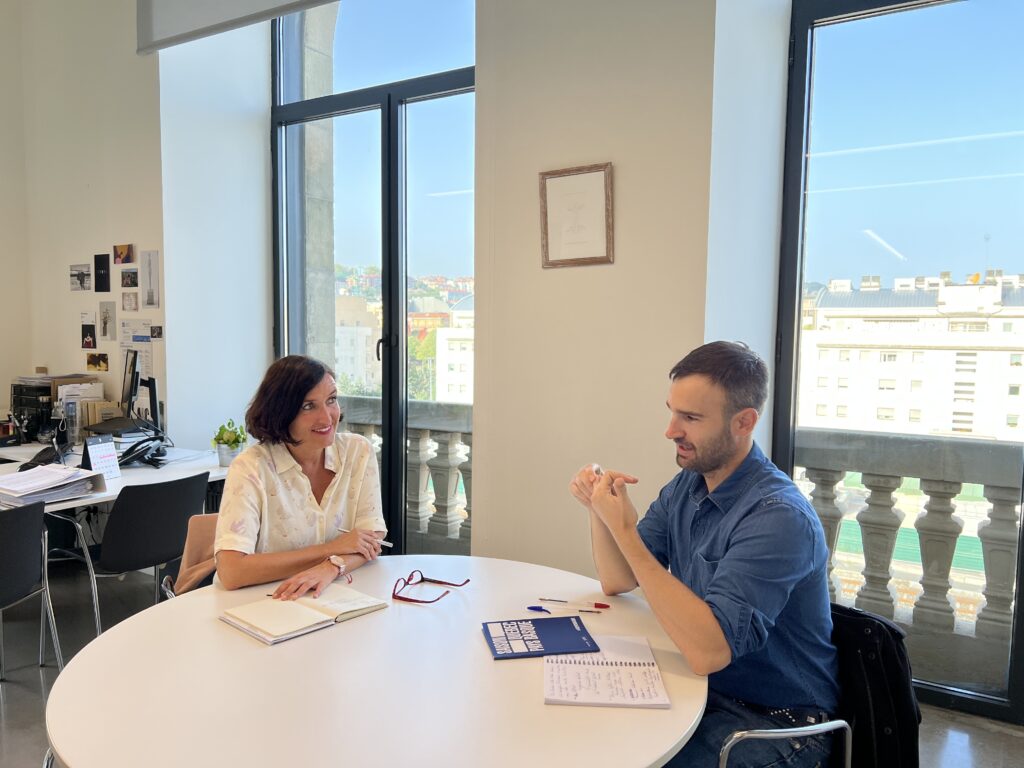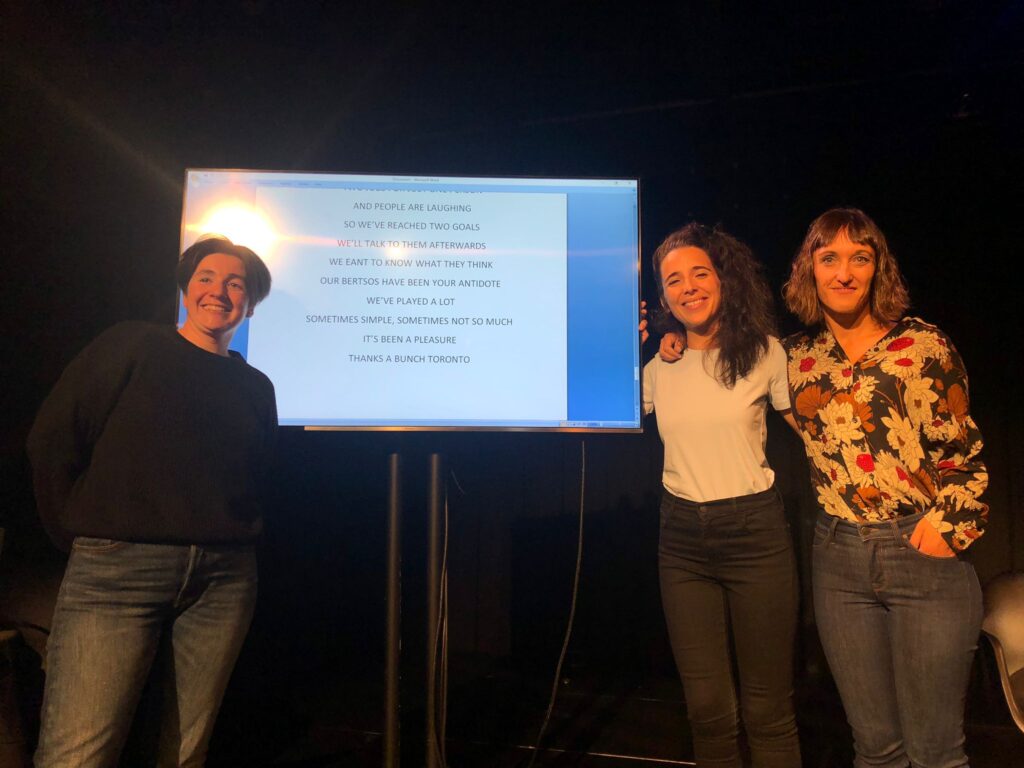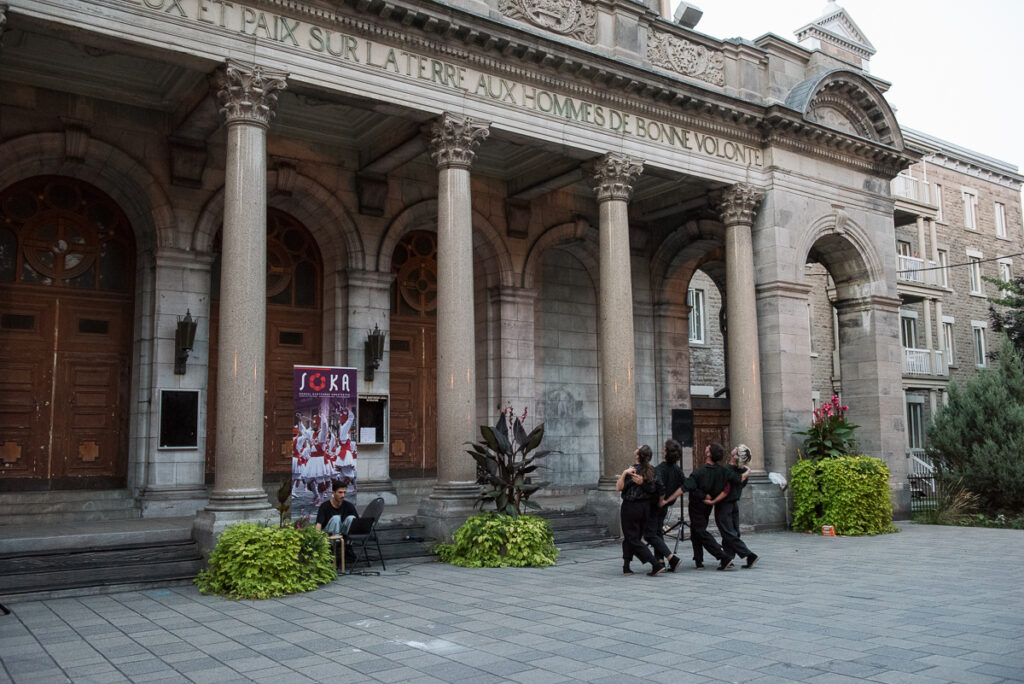First there was the cultural and artistic program Scotland goes Basque in 2019 and now, Saison Québec – Pays Basque in 2021 and 2022. Etxepare Basque Institute is developing this initiative together with the Ministry of Culture and Communications of Quebec to open a cultural window on both sides of the Atlantic Ocean through different artistic works. The objective is to strengthen ties between both territories through language, culture and art.
by Aitor Azurki
“When we were in Quebec, they told us about their history and took us to their museums, and right away we knew they are telling our history. That is, we are telling the story of our Basque whalers, how they traveled to Quebec, and so on. And they are describing what those years were like when Quebecers used to hunt whales with the Basques. Their heritage remains in the roof tiles and tools transported there by our whalers. We are a part of their history; and they are a part of ours,” explains Irene Larraza, director of Etxepare Basque Institute.
This is how the representatives of that institution and the Basque Government saw it in 2018 when they made an initial trip to Quebec to strengthen ties and explore the possibilities of carrying out a reciprocal cultural initiative. The history was there, and the ties between Quebec and the Basque Country were inevitable and notorious. Not surprisingly, the Basque whalers (some of the most cutting-edge of the time) sailed the ocean in search of the sought-after mammals even before Christopher Columbus arrived in America.

“It’s true that this has brought us very close together, since, in the end, we are telling the same story in our own way. And that’s really beautiful. It’s a story that can be read positively, that is, a story of integration. That’s what we share on both sides of the ocean,” Larraza said.
That first contact trip we mentioned was part of the strategic framework designed by Etxepare in 2017. “Within the promotion of the Basque language outside the Basque Country, there were a series of economic aids and initiatives, but they were very dispersed throughout the world. Therefore, it was decided to create a project based on cultural or language relationships that already existed.” This is how the seed sprouted from what today is the Kultur Konexioak (Cultural Connections) initiative in Etxepare. It started with a project focused on Scotland that took place throughout 2019. The second was Saison Québec – Pays Basque, specifically.
In the case of Quebec, Etxepare explains that there was a previous institutional base in existence, since years back a framework agreement on cultural and environmental heritage had been signed between the Basque Government and Quebec. In that declaration of intent, both showed an interest in strengthening ties. Therefore, with this previous institutional framework and the ‘discovery’ of the shared history on the initial trip, the Quebec-Euskadi initiative took shape in 2019.
“From the 2018 trip, we returned with concrete relationships to put both ministries, the Ministry of Culture of the Basque Government, and the Ministry of Communication of the Government of Quebec in contact. First, we launched a line of funding to begin a series of projects that would be developed both in the Basque Country and in Quebec.” This is how the foundations set out to bring this multidisciplinary program to life in 2020, but the COVID-19 pandemic halted everything.

A Project Forced to Reorganize Several Times
The unusual year of 2020 brought nothing but problems for carrying out this initiative: “It was difficult, because we had to reorganize the whole program several times, since we didn’t want to do the activities online, but rather face to face or live. This made it difficult for us, but in the end, the project moved forward by the summer of 2021,” the director explains.
Among other events, the second edition of the program Itzultzaile Berriak / Nouveaux Traducteurs (New Translators) stands out, a project to build bridges between international and local translators through several translations done by Yanick Bédard and Michel Usereau with the assistance of Aiora Jaka.
Another initiative was Chekhov vs. Shakespeare, an epistolary dialogue between the Quebec writer Jean Désy and the Basque writer Aurelia Arkotxa. Specifically, this is an exchange of letters developed between June 2020 and November 2022 which ended with the publication of a book and a meeting, although the initiative dates back to the cultural capital of San Sebastian of 2016. In 2021, the academic conference Besteen Ahotsa / La voix des autres (the Voice of Others) was also held, which finally went online.
In October of 2021, the first live activities could be organized and began with the emblematic literature festival called Québec en toutes lettres 2021, which has been held in Quebec since 2010 with meetings and round-tables, where Basque writers Katixa Agirre, Itxaro Borda and Kirmen Uribe participated.
We must mention the international residency of comics creation to promote this discipline and promote the interaction of people from different countries. The selected artists were Higinia Garay, Jimmy Beaulieu and Marine des Mazery. During 2021, several Cinématheque Quebecoise film events were also held in both the Basque Country and Quebec.
Regarding music, Trío Zukan offered a concert together with the group from Quebec, Quasar Saxophone Quartet, both in Montreal and Vitoria-Gasteiz in October and November of 2021.

2022, A Year Full of Activities
This year presents itself full of cultural and artistic events, among which the international poetry festival of the town Trois-Rivière is worth highlighting from September 30 to October 9, specifically, where Basque writers Itxaro Borda, Uxue Alberdi, Miren Amuriza and Danele Sarriugarte participated. Another literature festival, Québec en toutes lettres, hosted an event on bertsolarism (the art of singing extemporaneously) with the participation of Xabi Paya and Maialen Lujanbio.
The international tour of the USA in 2022 and Canada in 2023 of the Kulunka Teatro company with its work André & Dorine is another of the activities of this initiative, where the company was selected in ¡Cinars Web¡, the International Virtual Conference of the Performing Arts for this tour. This company also took part in November 2022 with this work at OFF-Cinars, Montreal Biennial of Performing Arts, one of the main international performing arts gatherings.
As far as dance is concerned, Basque dancers and choreographers Kanpai, Xian Martínez and Igor Calonge performed and will perform dance residencies in Montreal in 2023, and Quebec artists have done the same in Donostia and Errenteria. In 2022, the Quartier Danses festival focused on contemporary Basque dance, with the participation of the Malandain Ballet, Lasala, Osa + Mujika and the Larrua Project.

As for the pianist Josu Okiñena, he performed a recital in the town of Nominingue in July based on works by Basque composers in the concert-talk format. Likewise, the singers from the province of Zuberoa (the Northern Basque region) Mikel Etxekopar and Claudine Arhancet made an artistic stay at the Centre des Musiciens du Monde during the end of September and beginning of October. Specifically, they collaborated with musician Marlene Jerome to experiment with the union between traditional Basque music and the indigenous Mi’kmaq culture of Quebec. Finally, this fall, the artist Xabi Aburruzaga presented his latest work Aurrez Aurre in Quebec, together with the musician Yves Lambert, after several concerts in the Basque Country, specifically in Legorreta, Getxo and Vitoria-Gasteiz.
We must mention the round-table of the symposium COHABITER: Imaginer les médiations culturelles au 21e siécle, where Helga Massetani, from Bitamine Faktoria, presented the Atlas Emocional del Bidasoa (Emotional Atlas of Bidasoa) project. Likewise, Bitamine Faktoria organized, together with Agence Topo and the Montreal artistic collective Dare-Dare, in June FRONTIÈRE: practiques artistiques transfrontalières, a gathering involving three specific projects.
Finally, we must mention, together with McGill University, the launch of the new chair of Basque studies, the Elbira Zipitria Fellowship. For the opening of this chair, an academic event was organized focusing on the teacher Elvira Zipitria, who was a pioneer in the teaching of the Basque language in the classrooms of the Basque Country.
Overall, Larraza emphasizes, “Our hope is that the experience with Quebec doesn’t end here; the objective is, after each cultural connection we make, that certain projects will be maintained over time. In fact, we already know that in 2023 we will continue with some of them in the areas of dance, cinema…”. In any case, Etxepare Basque Institute is already laying the foundations with different cultural agents and creators to undertake the next round trip ‘journey’, which will be, in this third edition, with Flanders, in Belgium, throughout 2023 and 2024. A territory with a language which, because its case is less known, will undoubtedly be the setting of an enriching experience that will host more than one pleasant surprise in the form of cultural and artistic initiatives.


Be the first to comment on "The Basque Language and Culture are Present in Quebec"